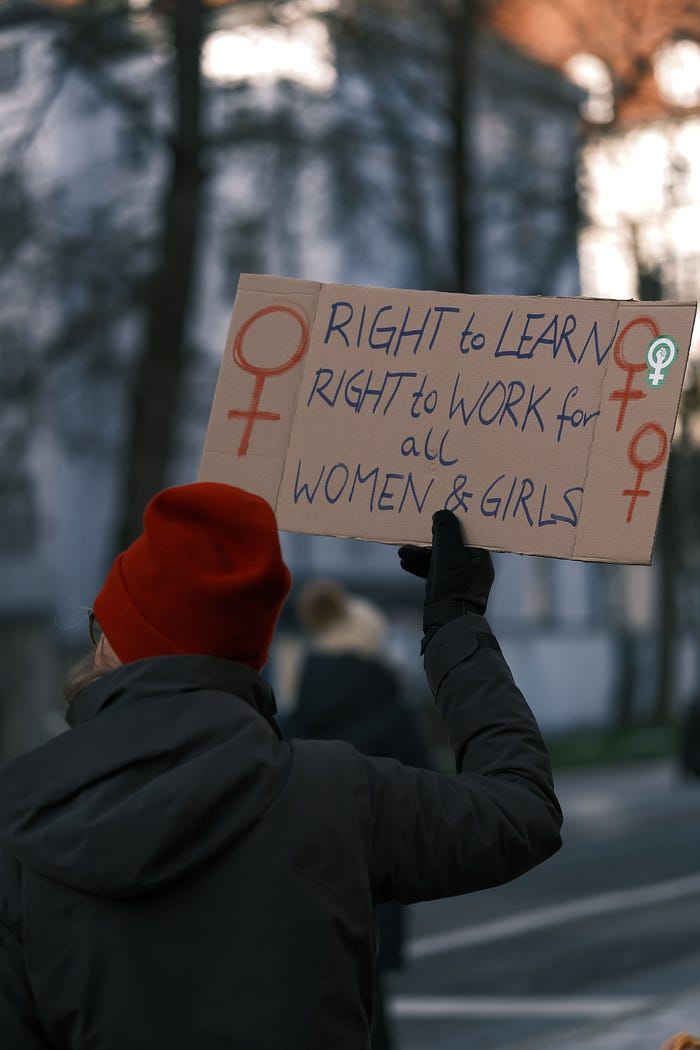International Women’s Day 2023: Women and girls are being barred from attending school in Afghanistan.

International Women’s Day is celebrated annually on March 8th. An official holiday in some countries, in others it is casually observed as a day of awareness and advocacy.
The first International Women’s Day was celebrated in 1911 by Austria, Denmark, Germany, and Switzerland. Since then, the holiday has grown annually, becoming a global celebration of women’s achievements and a clarion call for gender equality.
Activists and feminists have frequently used International Women’s Day to rally together and protest against various forms of discrimination and inequality, such as gender-based violence, unequal pay, and lack of access to education and healthcare.
In many countries, International Women’s Day is celebrated with cultural events, including music, dance, and theater performances, as well as exhibitions showcasing the achievements of women in various fields.
Some governments and organizations have used this day to make policy changes or announcements related to gender equality, such as passing new laws to protect women’s rights or announcing new initiatives to increase representation.
Human rights organizations always use International Women’s Day as a chance to raise funds and awareness for causes and nonprofits that support women — such as domestic violence shelters and women’s health clinics — or provide education and training initiatives for women and girls in developing nations.
Unfortunately, there are many countries around the world where women’s educational rights are still being denied or restricted.
Chief among them on International Women’s Day 2023 is Afghanistan.
The history of women’s rights in Afghanistan is complex, with significant gains and setbacks over time. Before the Soviet invasion of Afghanistan in 1979, women had a relatively high level of freedom to participate in society.
However, the Soviet occupation and subsequent civil war led to significant changes in the social and political landscape, including the erosion of women’s rights. During the Taliban regime (1996–2001), women in Afghanistan were subjected to some of the most severe human rights abuses in recent history.
The Taliban imposed strict laws, banning women from working, attending school, leaving their homes without a male relative, and even wearing shoes that made noise when they walked. Women who defied these rules faced severe punishment, including public floggings, beatings, imprisonment, and execution.
In the wake of the US-led invasion of Afghanistan in 2001, there were initial hopes that women’s rights would be restored. The Afghan Constitution adopted in 2004 enshrined gender equality and recognized women’s rights to education, work, and political participation. Under its auspices, women were able to return to schools and universities, and many entered the workforce, including government positions.
The complete withdrawal of American troops from Afghanistan in 2021 has had a significant impact on women’s rights in the country, among other things. Since the Taliban takeover of Afghanistan, there have been severe restrictions on women’s rights and freedoms, including restrictions on education, employment, and freedom of movement.
The collapse of the Afghan government and security forces led to an immediate breakdown in basic public services, including healthcare, education, and transportation. The economy has been severely impacted, and many Afghans are struggling desperately.
The humanitarian situation in Afghanistan is dire, with millions of people in need of assistance. The country was already facing a food and water crisis before the Taliban takeover, and the problems have only worsened since then.
Many Afghans are at risk of starvation and in urgent need of aid. Now that women have been banned from working for foreign and domestic humanitarian aid organizations, the situation is growing more heartbreaking by the day.
“Now, amid spiraling poverty and the difficulty of finding sustainable jobs — only five percent of Afghan families have enough to eat daily, and inflation for essential house-hold goods is at 40 percent — even more families are struggling,” reported Robyn Huang for Al-Jazeera on August 14, 2022.
The Taliban’s takeover of Afghanistan has created significant challenges and problems for the country and its people, well beyond the issue of starvation.
There’s bad news this International Women’s Day: “International Women’s Day: The exclusion of Afghan women,” reported Al-Jazeera today.
“Afghanistan’s Taliban Ban All Education for Girls,” was the Wall Street Journal’s take on December 21, 2022.
“In a gathering in Kabul with private-school directors, clerics and community representatives, Taliban officials on Wednesday also barred female staff, including teachers, from working in schools, closing off one of the few professions that had remained open to Afghan women under the new government, according to school principals who attended the meeting,” reported the WSJ. “They also said adult women could no longer visit mosques or attend religious seminaries.”
At the time, the Wall Street Journal added that women have been, “banned from nearly all jobs, except medical professions,” and that, “Women can also no longer visit public parks.”
“This decision has destroyed the dreams of a nation,” one bereaved father told the news outlet, “and the dreams of my daughters.”
“Afghanistan universities reopen but women still barred by Taliban,” Al-Jazeera confirmed the bad news on March 6, 2023.
The eerie images of college recruiting materials, billboards, and other public advertisements, showing smiling male students, with the ghostly, scratched-out vestiges of female students — poorly obscured — beside them were emblematic of the travesty.
On February 10, 2023, Al-Jazeera provided its readers with a glimpse into life for women in Afghanistan.
In the “Afghanistan’s women: Life under Taliban restrictions,” podcast, former Afghan Ambassador to the U.S. Adela Raz conveyed some of the terror and hopelessness felt by women and girls under Taliban rule.
“Everybody is trying to grasp something that gives them hope, and that hope is getting eliminated on a daily basis,” said Ms. Raz.
(contributing writer, Brooke Bell)